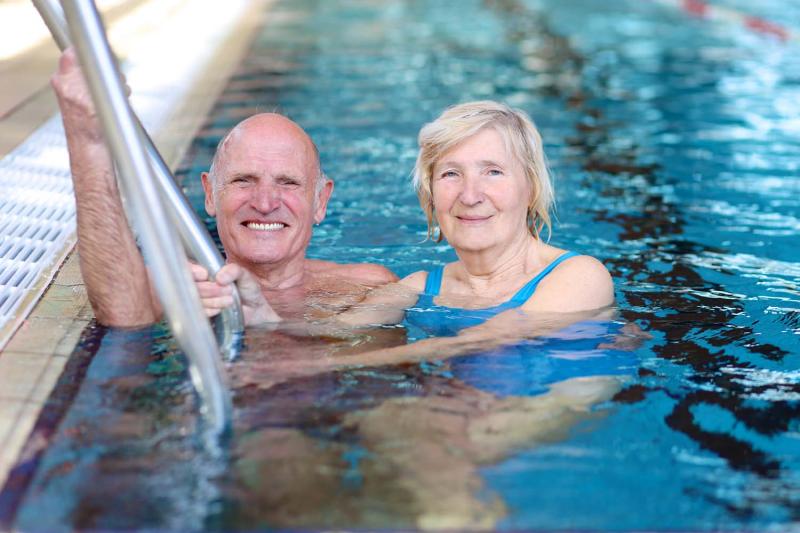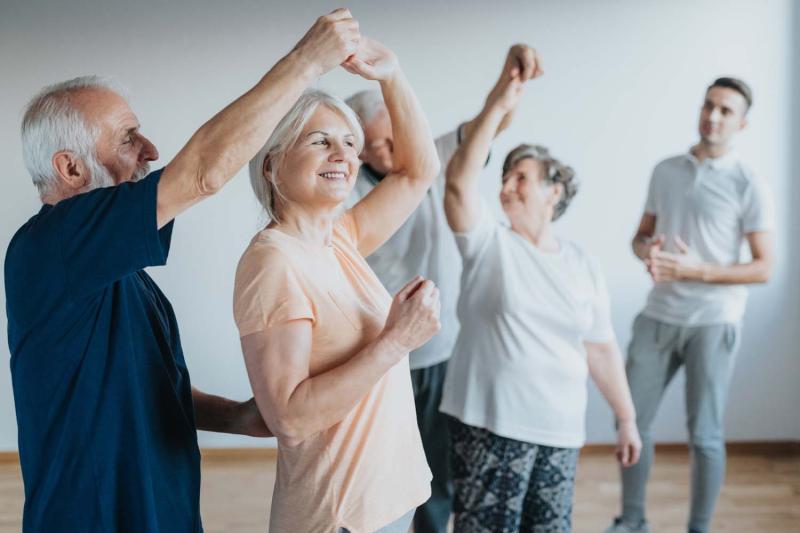Key points
- Physical activity is important for the health and wellbeing of older people, meaningful physical activity is important to increase life satisfaction.
- To motivate older adults to participate, physical activities need to be enjoyable, offer social interaction, and be tailored to the individual’s functional ability and interests.
- Meaningful physical activities should be tailored to the individual and led by trained professionals who are familiar to and trusted by older adults.
Physical activity is defined by the World Health Organisation (WHO) as any bodily movement produced by skeletal muscles that requires energy expenditure and includes activities for leisure, transportation, or as part of a person’s occupational duties. [1] Participating in physical activity is particularly important for older adults to maintain mobility and physical function. Guidelines suggest that adults over the age of 65 should participate in physical activities focusing on cardiovascular fitness, balance, and strength training at moderate intensity or higher for 30-minutes at least three times a week. [1] However, being physically active can be challenging for older people because of age-related changes such as reduced muscle mass, flexibility, and an increased number of chronic health conditions. [2] Therefore, aged care services need to provide physical activities that individuals are interested in and that support participation for those with declining functional abilities.
This evidence theme is a summary of one of the key topics identified by a scoping review of research on meaningful lifestyle activities in aged care. We found several systematic reviews that explore the experiences of health care personnel in supporting physical activity for aged care residents as well as research that reports the attitudes and preferences of older people relating to exercise. [3, 4] This theme also describes some of the factors shown to increase or decrease a person living with dementia from participating in group activities [5]
What makes specific physical activities ‘meaningful’ to older adults will be unique to the individual and dependent on factors such as personality, interests, and life history. When a person is unable to participate in a physical activity that they find meaningful, this can affect their mood and leave them with a reduced sense of satisfaction with life. [3]
Factors preventing participation in meaningful physical activities
Older adults in aged care settings report that physical limitations, pain, fear of falling, and other comorbidities can prevent them from participating in the physical activities they previously enjoyed. [5] Other barriers reported include:
- Staff safety concerns for residents with poorer health
- Lack of appropriate spaces to perform physical activities
- A lack of staff availably to provide and support physical activities
- Low motivation of staff and older adults to participate. [5]
Factors promoting participation in meaningful physical activity
People could be encouraged to successfully participate in physical activities by programs tailored and adapted to their own capabilities. Other factors shown to encourage and motivate older adults to participate include:
- Programs delivered by familiar staff members capable of supporting individuals to participate and to be successful in their activity
- Social recognition and encouragement from others
- Enjoyable activities that include social engagement with others in a group (although this was not a motivating factor for all aged care residents)
- Physical activity connected to functional tasks and continued independence. [4, 5]
Examples of meaningful physical activities
The research describes a wide range of physical activities with physical and mental benefits that aged care staff can provide to people at various levels of physical and cognitive ability. However, unless an activity has meaning for an older person, it is unlikely they will enjoy it or see any benefit in participating in it.
Dance is a physical activity that some, but not necessarily all, older adults may find more enjoyable, socially engaging, and therefore preferable to more class-based repetitive activities. Dancing is recommended as a meaningful physical activity, particularly for those who enjoyed dancing prior to requiring aged care. [7] Physical activities considered meaningful to older adults may include:
- Walking and discovery walks
- Lawn bowls or skittles
- Cycling
- Yoga
- Pilates
- Tai Chi.
Gardening is another example of a potentially meaningful physical activity. This activity is covered in detail in nature-based activities.
Individuals can help to support engagement in meaningful physical activities by:
- Asking questions and understanding what activities individuals have found enjoyable and interesting throughout their life.
- Offering physical activities that cater to different interests and preferences. For example, some people may be drawn to mind-body exercises performed in quiet spaces while others will prefer more vigorous activities that include opportunities for social interaction.
- Provide encouragement, positive feedback and recognise the efforts made by older adults participating in physical activities.
Organisations can support the integration of meaningful physical activities into aged care by:
- Carry out thorough assessments to determine the abilities of individual aged care users. Design or source programs that cater to all levels of ability.
- Support staff to tailor physical activities to the needs and interests of the individual so that they are more likely to be ‘meaningful’ and encourage participation.
- Provide appropriate environments to support programs offering meaningful physical activities to all older adults.
This evidence theme has been informed by the results of a rapid scoping review intended to map the current published research in this area. We acknowledge that our findings reflect only the limited evidence available concerning the concept of ‘meaningful’ physical activities. Furthermore, our Evidence Advisory Group (EAG) and practice professionals suggest this evidence may not adequately reflect the understanding and practical implementation of meaningful lifestyle activities in aged care.
For examples of activities that may be identified as meaningful physical activities please see the resources provided below.
- World Health Organisation. Physical activity [Internet]. Geneva: WHO; 2020 [cited 2022 Sep 25]. Available from: https://www.who.int/news-room/fact-sheets/detail/physical-activity
- McPhee JS, French DP, Jackson D, Nazroo J, Pendleton N, Degens H. Physical activity in older age: Perspectives for healthy ageing and frailty. Biogerontology. 2016;17(3):567-80.
- Matarese M, Mauro L, Notarnicola I, Cinque A, Bonacci S, Covelli G, et al. Experiences of health care personnel with promoting a sense of home for older adults living in residential care facilities: A qualitative systematic review. JBI Evid Synth. 2022;11:11.
- Maurer C, Draganescu S, Mayer H, Gattinger H. Attitudes and needs of residents in long-term care facilities regarding physical activity: A systematic review and synthesis of qualitative studies. J Clin Nurs. 2019;28(13-14):2386-400.
- Vseteckova J, Deepak-Gopinath M, Borgstrom E, Holland C, Draper J, Pappas Y, et al. Barriers and facilitators to adherence to group exercise in institutionalized older people living with dementia: A systematic review. Eur Rev Aging Phys Act. 2018;15:11.
- Cordes T, Schoene D, Kemmler W, Wollesen B. Chair-based exercise interventions for nursing home residents: A systematic review. J Am Med Dir Assoc. 2021;22(4):733-40.
- Guzman-Garcia A, Hughes JC, James IA, Rochester L. Dancing as a psychosocial intervention in care homes: A systematic review of the literature. Int J Geriatr Psychiatry. 2013;28(9):914-24.
Connect to PubMed evidence
This PubMed topic search is limited to home care and residential aged care settings. You can choose to view all citations or citations to articles available free of charge.

